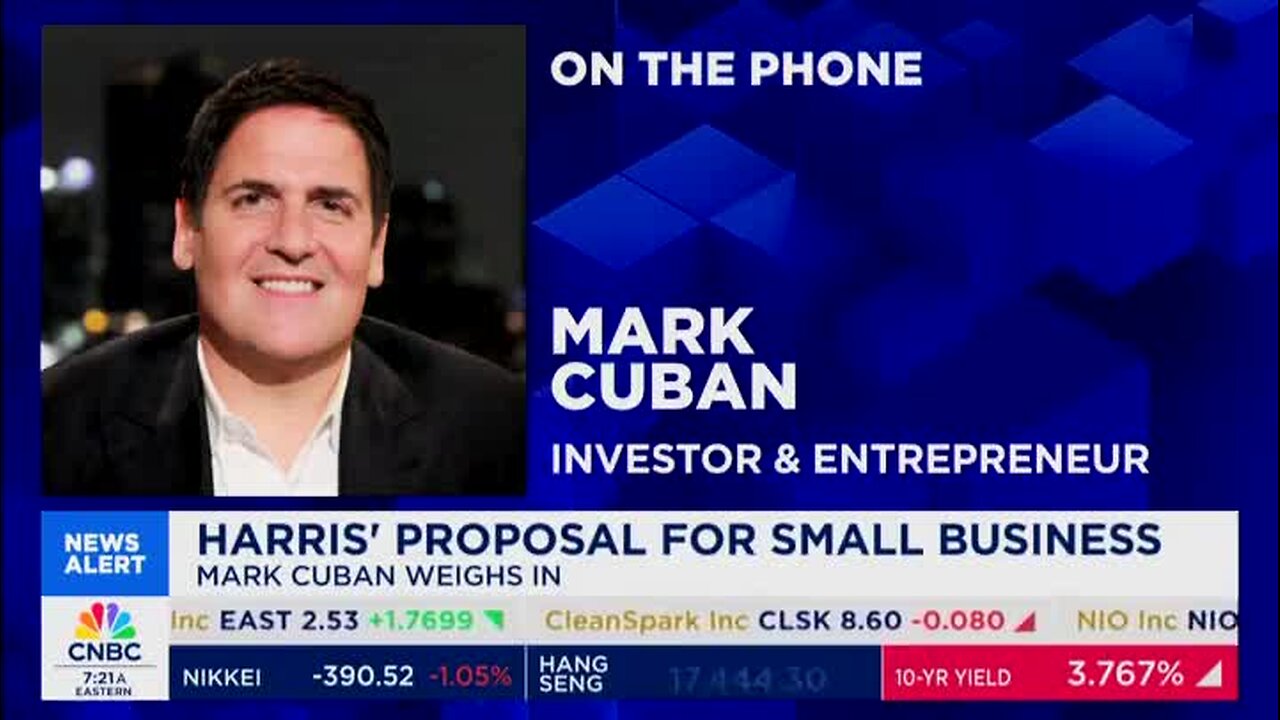Premium Only Content

Cuban Defends Kamala Not Offering Any Specifics About Her Proposals, Suggests She Should Be Elected and Then Decide
SORKIN: “If people are policy, what are the kinds of people you think she’s ultimately going to appoint to her cabinet and around her? And I’m thinking of a Treasury secretary. I’m thinking of —“
Cuban: “I have no idea. I have no idea.”
SORKIN: “— you know folks who are going to run commerce. But I think it’s an important question. I think it’s a question about who’s going to run the FTC, who’s going to run antitrust for the DoJ. I mean, do you get a sense — and I think one of the critiques has been that the Biden Administration did not surround itself with virtually anybody from the private sector.”
Cuban: “Right. I agree with you 100 percent. So two things. One, I told her — I told her team, look, put my name in for the FTC. It needs to change. And two, that I’ve strongly suggested that she put together a multilevel business advisory group. And they said, once we get past the debate, it’s something we’re going to look very strongly at. And when I — you know, the details of that that I suggested were 1, you have small entrepreneurs and just a council of those types of business people, 2, medium sized companies because they have different issues than smaller, larger. And then, you know, the big companies, because they’re going to have a completely different perspective. Because the advisory groups that I’ve been on, there’s a whole wide range of people, and it’s hard for anybody to come to an alignment because we all have different priorities. But by having this three-tier council — and again, these are just conversations I’m having, I’m not committing to anything for them, but they’re very open to them.”
QUICK: “Hey Mark, can I —“
Cuban: “I can’t express enough that they always say, give us your ideas, give us your ideas. And when I talk to other business people, they’re saying the same thing.”
SORKIN: “Right. And that’s a distinction.”
Cuban: “She’s litteraly havinh conversation with them.”
SORKIN: “That’s a distinction.”
QUICK: “But — but can I ask, Mark, I — I — I — I think it’s a — a little crazy that we’re like 60 days out, two months until we get to Election Day. And there aren’t details around either of these candidates’ plans to any certain extent. We’re talking about this today. You called it — we ask you all the time to come on. You say, ‘No, no, no.’”
Cuban: “Yeah.”
QUICK: “I’m guessing you called in this morning because you’re interested in what you’re hearing about finally starting to put a little bit of meat on the bones. But we still don’t even know the number. We don’t know if it’s 28 or 33 percent for the capital gains when you include the other tax that’s part of that. We’re guessing around the edges, you think 28 percent would be OK and 33 percent would not be OK.”
Cuban: “Right. Yeah.”
QUICK: “And both of these candidates seem to be at the point where they’re basically promising lots of things to lots of people without trying to figure out ways to pay for it. They both agree in some crazy places, whether that be we’re not going to tax tips anymore, whether that’s we’re going to — you know, just the number of things that they actually agree on, whether it’s the Nipon Steel deal. They agree on a lot of things, where they are differentiated, it’s hard to get real details on any of these things. And we’re 60 days away. So in a lot of ways, I think Americans are kind being asked to give it a flyer and we’ll go with our best guess on things.”
Cuban: “Well, a couple of things. One, you know, if — if you’ve ever taken over a company that was floundering, let’s say the CEO got fired and you had to step in, it takes a lot more than the 40 days that she’s been in this position to turn things around. It’s not like we’ve heard the Starbucks new CEO come out with every plan, you know, and said everything that they’re going to do. It takes time to pull these pieces together. To go from zero to 100 miles an hour is not easy. So that’s first and foremost the most important. And second, you know, she’s not just — behind the scenes she is working on the details to determine how we can reduce the deficit. Obviously, if interest rates go go down, that’ll help a lot. But more importantly, you know, as I mentioned earlier, we’re having conversations like some of the things that I’ve discussed with her team that they haven’t said no to, but you know, things like a higher tax on stock buybacks, which I’m a fan of, right, because I think that’s financial engineering. But, you know, depending on where you take that, where does that lead, right? So if you increase the tax on stock buybacks to 3 percent, 4 percent, which may — some people may seem — think is high, then what are the downstream impacts? Well, if you do that, maybe companies will start paying dividends more. Well, then there’s the issue of double taxation. So right now, you know, dividends are exempt up to $89,000 for a couple filing jointly. Well, what if you increase that to $250,000 or $400,000? Now, all of a sudden, you change the way economics work for a lot of people, right? So now you’re probably going to get more people buying shares of stock and from — as a result, getting more dividends and then paying taxes on those. And, then you know, let’s do the math to see what happens to the deficit and how much revenue that can increase. Wait. The other conversation is taxing people borrowing against —“
SORKIN: “Right.”
Cuban: “— liquid assets or even illiquid assets. Well, the conversation I told them — and this is my feedback to them — when interest rates were low, a lot of people were doing that because it was a great art. You know, it was, you know, a domestic carry trade, if you will, borrow at 2 percent and invest in a, you know, a bond at 4 percent or 5 percent. Because interest rates are higher, that’s not going to generate as much revenue, but it’s a conversation you need to have, et cetera. So, you know, Becky, to your point, she’s not publishing a lot of details because she’s still trying to flesh out what —“
SORKIN: “Right.”
Cuban: “— all the details should be. The great — the great part of the conversation is she’s not jumping. She’s not ideological about this at all. She’s like, what is the best way to approach increasing the amount of investment, taxing people fairly so you don’t reduce investment and reducing the deficit? You got to get to the details, Becky, before you can just throw out policies just to make people happy by throwing out policies.”
-
 1:21
1:21
Grabien
15 hours agoStephen A. Smith Unleashes on Dems for Posting Identical Anti-Trump Videos: ‘You Wonder Why You’re No Longer in Power’
66 -
 1:00:54
1:00:54
The Tom Renz Show
6 hours agoMore Epstein/FBI, a Scary Trade War, & the Dem Echo Chamber
829 -
 40:43
40:43
Kimberly Guilfoyle
7 hours agoDems Double Down on Delusion-Why? Live with Tony Kinnett & Bo French | Ep.202
61.7K30 -
 1:28:42
1:28:42
Redacted News
5 hours agoBREAKING! SOMETHING BIG IS HAPPENING IN EUROPE ALL OUT WAR IS COMING AGAINST RUSSIA, TRUMP FURIOUS
108K259 -
 47:50
47:50
Candace Show Podcast
6 hours agoBREAKING: Judge Makes Statement Regarding Taylor Swift's Text Messages. | Candace Ep 155
94.3K104 -
 DVR
DVR
Josh Pate's College Football Show
2 hours agoCFB’s Most Hated Teams | FSU & Clemson Future | Big Ten Win Totals | Star Rankings Overrated?
5.76K -
 1:33:47
1:33:47
CatfishedOnline
4 hours agoGoing Live With Robert - Weekly Recap
19.4K -
 55:18
55:18
LFA TV
1 day agoEurope’s Sudden Turn Against America | TRUMPET DAILY 3.6.25 7PM
25.5K3 -
 4:21
4:21
Tundra Tactical
4 hours ago $1.38 earnedPam Bondi MUST Enforce Due Process NOW!
18.4K1 -
 56:42
56:42
VSiNLive
5 hours agoFollow the Money with Mitch Moss & Pauly Howard | Hour 1
43.6K1